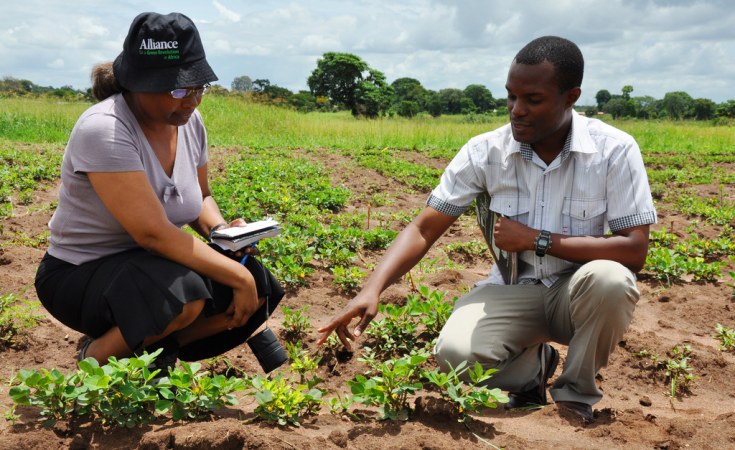In 1900, there were a mere 1.6 billion people on our planet. Today, there are seven billion and by 2050 we will be nine billion. One would expect that with such rapid population growth, occurring in the midst of soaring food prices and food-related crises, we would be doing everything we could to increase food security for our most vulnerable people.
And yet, incredibly, in areas where the need is the greatest, the opposite often is true. Today, in many developing countries, home to the majority of the world's 925 million undernourished people, there is a tangled web of policies and practices that specifically and sometimes intentionally inhibit a large group of farmers from producing more food in their fields and pastures. Despite the fact that in many places they often comprise half or more of the agriculture workforce, these farmers face restrictions on their ability to buy, sell, or inherit land and livestock. They often are forbidden from opening savings accounts, borrowing money, or even selling crops at market.
And what is the basis for these self-defeating practices? It is the simple fact that these farmers happen to be women.
For example, the United Nations Children's Agency (Unicef) estimates that women in Cameroon are doing 75 percent of the agricultural work, yet own less than 10 percent of the farmland. And the situation is much the same in Kenya, Nigeria and Tanzania. Similarly, in Southeast Asia, women are responsible for 90 percent of the rice production. But in India, Nepal and Thailand, they own less than 10 percent of the land. A study in Burkina Faso links gender-based restrictions on access to labor and fertilizer with a 30-percent reduction in yields on plots farmed by women versus those maintained by men. In Namibia, it is still common for a woman to lose all of her livestock if her husband dies.
This type of agriculture inequity affects more than just women. It is handicapping entire regions. The UN Food and Agriculture Organization (FAO) estimates that leveling the plowing field for women could increase total agriculture output in developing countries by 2.5 to four percent and reduce the number of hungry people in the world by 12 to 17 percent-that's 100 to 150 million people. Put another way, gender bias in agriculture is condemning millions of boys and girls to growing up hungry, a condition that routinely leads to a life of poor health and poverty.
There is, thankfully, a growing recognition that these discriminatory practices have to end.
This week a dream team of World Food Prize laureates, government ministers, farmers, agriculture researchers, gender experts and community development organizations will be in New Delhi, India for the first ever Global Conference on Women in Agriculture. It is sponsored by the Global Forum on Agricultural Research (GFAR), along with the Indian Council of Agricultural Research (ICAR) and the Asian-Pacific Association of Agricultural Research Institutions (APAARI).
The goal of the conference is to focus on the many ways in which equalizing the status of the woman farmer is critical to reducing poverty in the developing world and ensuring food production keeps pace with population growth. Conference participants see gender equity in agriculture as particularly important given that investors, donor governments, philanthropic organizations and developing countries themselves are pouring hundreds of millions of dollars into agriculture-oriented development efforts. But in many cases they are doing so without properly assessing the importance of women to their success.
India offers a cautionary story. While its Green Revolution has powered spectacular increases in food production and income, 46 percent of India's children still experience stunted growth, a prime indication of malnutrition. The World Bank notes that throughout South Asia, the inferior status of women is a key reason agriculture production increases have not generated the expected nutritional improvements.
Countries in sub-Saharan Africa, which are rightly pursuing their own Green Revolution, should be particularly mindful of the need to make women an equal partner in agriculture development. In particular, women farmers need to have a seat at the table as African governments deal with the surge of land investment from the so-called BRIC nations of Brazil, Russia, India and China who are seeking land for food and biofuel production. Efforts being made to transform African agriculture will require interventions, investments and policies that focus explicitly on empowering women and ensuring that their voice is heard on the farm, in the lab, in the boardroom and in the halls of parliament and government.
A recent report from the International Food Policy Research Institute (IFPRI) warns that given their long-standing lack of land rights, these land deals-which involve millions of hectares-threaten to further marginalize women farmers and thus undermine efforts to improve food security in Africa.
Western countries eager to assist agriculture-oriented poverty reduction efforts also need to rethink their common assumptions of gender roles in food security: the man as food producer (the farmer beside his tractor or horse) and the woman as food preparer, making nutritional choices and managing the children.
Today, in much of the world, when the family sits down to dinner at night, the woman has not just cooked the food. She also has likely planted, harvested, milked or butchered what's on the table.
Idah Sithole-Niang is an associate professor at the University of Zimbabwe, and steering committee chair of the African Women in Agricultural Research and Development (AWARD) program.


